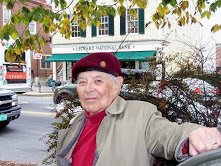
Gregory Rabassa, renowned teacher, scholar and translator, died June 13, in Branford, Connecticut. He was 94 and had a home in Hampton Bays.
Dr. Rabassa was born March 9, 1922, in Yonkers, to Clara Macfarland of New York, and Miguel Rabassa of Cuba. He grew up in Hanover, New Hampshire, where his parents operated a popular inn known as the Villaclara Farm. Graduating from Hanover High School in 1940, he attended Dartmouth College. When the United States entered World War II, Dr. Rabassa, still in college, volunteered for the Enlisted Reserve Corps. Called up before he could graduate, Dr. Rabassa, who had taken his comprehensive examinations in romance languages, was six points short of graduation. It was while he was involved with the Fifth Army in the European campaign that, much to his surprise, Dr. Rabassa received his diploma in the mail. Dartmouth officials, he was pleased to learn, had determined that his Army service had provided him with sufficient physical education training to gain him the needed three points in that area and that his participation in the war effort, in North Africa and Italy, had given him the also needed three points in modern European history, which Dr. Rabassa, with characteristic wit, would later say that he was not only studying but helping to make. A decorated veteran with a rank of staff sergeant of infantry, Dr. Rabassa took great pride in his military service and in his decoding, encryption and cipher work with the Office of Strategic Services (OSS).
It was while serving in Caserta, Italy, and doing this kind of work, that Dr. Rabassa felt he received his earliest lessons in the art of translation. In 1945, Dr. Rabassa enrolled at Columbia University as a graduate student in Spanish. Later, in 1954, Dr. Rabassa would receive his Ph.D. in Portuguese and Luso-Brazilian literature. Dr. Rabassa was invited to stay on in the Columbia system, teaching Spanish at Columbia College, honing his Portuguese, and also attending Columbia University seminars on James Joyce (where he studied with William York Tindall and from which he gained a lifelong love of Joyce and his work, especially “Finnegans Wake”) and classes offered by the German, Italian, and French programs. Part of his assignment at Columbia College was teaching in the Great Books program, which he thoroughly enjoyed and which allowed him to develop his love of Shakespeare and Faulkner. Dr. Rabassa stayed on at Columbia until 1969, when, having been offered a position as professor of romance languages and comparative literature, he left to join the faculty at Queens College and the City University of New York Graduate Center. He held this position until his retirement as distinguished professor of romance languages and comparative literature.
Dr. Rabassa was widely known as “the translator’s translator.” Publisher Alfred A. Knopf once dubbed Dr. Rabassa the “pope of translation.” For William Kennedy, Dr. Rabassa ranked as one of the greatest translators “who ever drew breath.”
It was through his translations that Dr. Rabassa would become the writer he had always wanted to be. Gabriel García Márquez, the author of “One Hundred Years of Solitude” (a novel that Dr. Rabassa also translated), once described Dr. Rabassa as “The best Latin American writer working in the English language.” Dr. Rabassa’s many awards include the National Medal of Arts, New York Public Library Literary Lion, PEN/Ralph Manheim Medal, PEN/Martha Albrand Medal, PEN/Gregory Kolovakos Award, American Academy of Arts and Letters Literature Prize, a Guggenheim Fellowship and the Brazilian Studies Association Lifetime Achievement Award.
Outside of the literary world, he had a love for nature. Whether it was bird-watching, hiking, or observing a particular bird or tree while out on a walk, he thrived on it. He spent many years in Hampton Bays, enjoying the wildlife of the area. He was also an avid stamp collector.
He is survived by his wife, Clementine; daughters Kate Rabassa Wallen and Clara Rabassa; and granddaughters Jennifer Wallen and Sarah Wallen.
The funeral is private. Condolences may be left at gregoryfdoylefuneralhome.com.
Memorial donations may be made to the OSS Society and Dartmouth College.